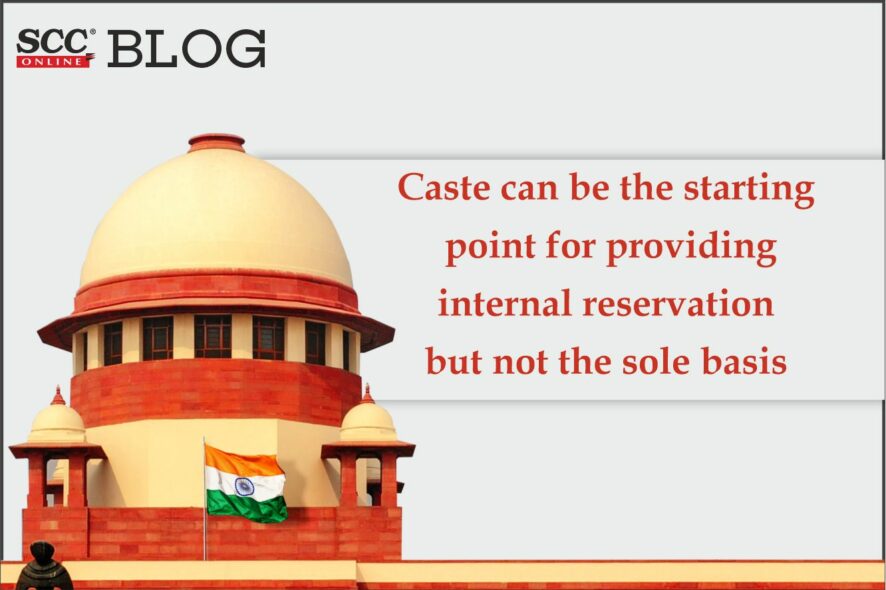Supreme Court: In a case relating to reservation of seats in Educational Institutions, the bench of L. Nageswara Rao* and BR Gavai, JJ has observed that while caste can be the starting point for providing internal reservation, it is incumbent on the State Government to justify the reasonableness of the decision and demonstrate that caste is not the sole basis.
After demand was made by various communities to provide for internal reservation, within the reservation provided to ‘Most Backward Classes (MBCs) and Denotified Communities (DNCs), a letter was written by the Government to Justice M. Thanikachalam, the Chairman of Tamil Nadu Backward Classes Commission, to give his opinion regarding the possibility of providing internal reservation amongst the communities listed as MBCs and DNCs within the 20 per cent reservation made available to them. Justice M. Thanikachalam promptly recommended sub-categorization amongst the MBCs and DNCs based on the proportion of their population.
Immediately thereafter, on 24.02.2021, a bill for special reservation within the 20 per cent reserved for MBCs and DNCs was placed before the State Legislative Assembly. On the same day, the bill was passed and it received the assent of the Governor on 26.02.2021.
By the Tamil Nadu Special Reservation of seats in Educational Institutions including Private Educational Institutions and of appointments or posts in the services under the State within the Reservation for the Most Backward Classes and Denotified Communities Act, 2021, reservation of seats in educational institutions, including private educational institutions, and reservation in appointment or posts in the services under the State were provided in the following manner: ten and a half per cent for ‘Part-MBC (V) Communities’, seven per cent for ‘Part-MBC and DNC Communities’ and two and a half per cent for ‘Part-MBC Communities’. In terms of the Schedule annexed to the 2021 Act, ‘Part-MBC(V)’ consists of Vanniakula Kshatriya community (including Vanniyar, Vanniya, Vannia Gounder, Gounder or Kander, Padayachi, Palli and Agnikula Kshatriya), ‘Part-MBC and DNC’ comprise 25 communities from the MBCs and 68 DNCs and the remaining 22 communities of MBCs come under the category of ‘Part-MBC’.
The 2021 Act was declared as unconstitutional by the Madras High Court by holding that the State Legislature has no competence to enact the 2021 Act.
The High Court further found that the internal reservation made only on the basis of caste is violative of the Constitution. It was of the opinion that there was no quantifiable data relating to the population, socio-economic status and representation of the backward classes in the services.
While the Supreme Court partly disagreed with the High Court and held that there is no bar on the legislative competence of the State to enact the 2021 Act, it agreed with the conclusion that there is no substantial basis for classifying the Vanniakula Kshatriyas into one group to be treated differentially from the remaining 115 communities within the MBCs and DNCs, and therefore, the 2021 Act is in violation of Articles 14, 15 and 16.
Key highlights of the 87 pages long judgment
- The 105th Amendment Act being prospective in operation, it is the 102nd Amendment Act which held the field at the time of enactment of the 2021 Act.
- As the 2021 Act dealt with sub-classification and apportionment of certain percentage of reservation for the purpose of determining the extent of reservation of communities within the MBCs and DNCs, it is a permissible exercise of power by the State Government under Article 342-A of the Constitution. Prior to the 105th Amendment Act, what was prohibited for the State to carry out under Article 342-A is the identification of SEBCs, by inclusion or exclusion of communities in the Presidential list of SEBCs. It is clear that the exercise of identification of MBCs and DNCs had been completed by the State pursuant to the 1994 Act.
- There is no bar to the sub-classification amongst backward classes. The State’s competence in the present case to enact the 2021 Act is not taken away on this ground as, admittedly, the Presidential list of SEBCs is yet to be published, making the question of tinkering with such list redundant.
- Detailing the extent of reservation for communities already identified as MBCs and DNCs, which is the thrust of the 2021 Act, cannot be said to be in conflict with the 1994 Act, as determination of extent of reservation for various communities was not the subject matter of the 1994 Act.
- To differentiate a particular class / category from others, there should be a substantial distinction which clearly demarcates that class / category. In the instant case, there was no justification for how the Vanniakula Kshatriyas can be treated as a different class and meted out preferential treatment, being one amongst the 116 communities, who have all been considered on the same footing till the enactment of the 2021 Act and were, therefore, eligible to claim the benefit of undivided 20 per cent reservation.
- Population has been made the sole basis for recommending internal reservation for the Vanniakula Kshatriyas, which is directly in the teeth of the law laid down by this Court.
[Pattali Makal Katchi v. A. Mayilerumperumal, 2022 SCC OnLine SC 386, decided on 31.03.2022]
*Judgment by: Justice L Nageswara Rao
Counsels
For Appellants: Senior Advocates Dr. Abhishek Manu Singhvi, P. Wilson, Rakesh Diwedi, Mukul Rohatgi, C.S. Vaidyanathan, M. N. Rao and Radhakrishnan
For respondents: Senior Advocates Dr. Rajeev Dhawan, R. Balasubramanian, K. M. Vijayan, S. Nagamuthu, Gopal Sankaranarayanan, V. Prakash, Jaideep Gupta and Colin Gonsalves







